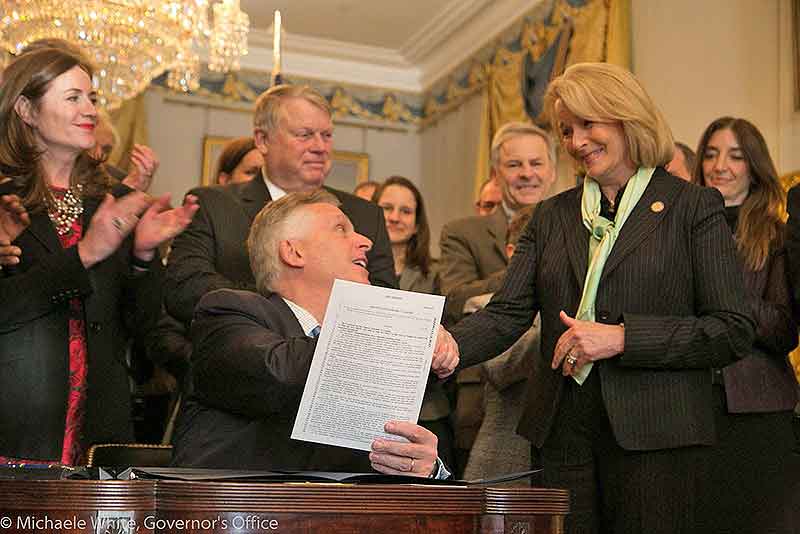General Assembly Retains Focus on Building New Virginia Economy
In Governor McAuliffe’s State of the Commonwealth address in January, 2016, he made clear his priorities for the upcoming General Assembly session. He argued that our focus should be on building a new Virginia economy that is diversified and robust, and investing in education at all levels to encourage creativity and innovation. He also stated that if Republicans in the House or Senate sent him legislation that was socially divisive or that threatened workers’ rights, women’s ability to control their reproductive health choices, discriminatory measures, or bills that transfer public investments from public schools to private entities, he would veto the bills.
The Governor kept his promises. He proposed a budget that included major new investments in ports, airports, and economic incentives. He proposed almost a billion dollars in additional funding for K-12 education, and substantial new investments in higher education. He supported the initiative of private business leaders called “Go Virginia.” During the General Assembly session, both the House and the Senate adopted most of the Governor’s proposals, and even increased funding for others. That was a wonderful example of finding common ground for the benefit of the Commonwealth.
Along the way, however, Republicans passed, as they have done in recent years, a series of measures that would undermine the rights of Virginia citizens. In response, Gov. McAuliffe vetoed 32 pieces of legislation coming out of this session.
During our Reconvene session of Wednesday, April 20, 2016, Democrats sustained every one of the Governor’s vetoes. Among the vetoes that were sustained (this means that the bills will not become law), are measures that would:
- Defund Planned Parenthood.
- Undermine efforts of the Commonwealth to produce a clean power plan.
- Extend inefficient and costly tax credits to coal producers.
- Deny localities the ability to contract with private companies to pay a living wage.
- Allow discrimination under the guise of religious freedom.
- Reverse the Governor’s executive orders to keep guns out of state administrative buildings.
- Remove the discretion of sheriffs and local law enforcement in handling immigration detention requests from the federal government.
- Place additional barriers on citizen’s ability to register and vote.
- Limit the ability of localities to determine the status of monuments in their cities and counties.
In addition, we passed a number of the proposals made by the Governor to change legislation and include new items in the budget. These included new additional monies for bioscience support and initiatives in cybersecurity.
Our efforts to enact a Solar Tax Credit targeted to investment in Southwest Virginia failed in a party line vote, as did the proposal to build a smaller and less punitive juvenile detention center.
Finally, the Governor’s proposal to make it easier to get drugs for lethal injection was passed by the General Assembly. This proposal arose in response to a bill that would make the electric chair the default execution method in Virginia in the event that the lethal injection drugs were not available. The Governor’s proposal proved very controversial because it would keep secret the identities of companies manufacturing the lethal cocktail as well as the components of the mixture. Civil libertarians argued against the measure and this was one area where I departed from the Governor by voting against it. In my career, I have voted against any measure that would expand the death penalty or make it easier to administer. While lethal injection is perceived as less cruel than the electric chair, it is nonetheless replete with all kinds of problems, and there have been many botched attempts using these drugs for execution. Accepting the Governor’s recommendation means that the death penalty will continue to be carried out in Virginia.
Town Hall Meetings
In the next month, I will be convening several town hall meetings to discuss the General Assembly session. I am also available to speak to groups about what we did and did not do in the 2016 session. We will provide more information about times and locations.

